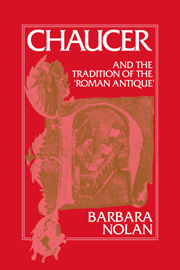Book contents
- Frontmatter
- Contents
- Acknowledgments
- List of abbreviations
- Introduction
- 1 Benoît de Sainte-Maure's Roman de Troie and the compositional practices of the roman antique
- 2 Plaits, debates, and judgments in the Roman de Thèbes, the Roman de Troie and the Roman d'Eneas
- 3 The poetics of fine amor in the French romans antiques
- 4 From history into fiction: Boccaccio's Filostrato and the question of foolish love
- 5 Boccaccio's Teseida and the triumph of Aristotelian virtue
- 6 Saving the poetry: authors, translators, texts, and readers in Chaucer's Book of Troilus and Criseyde
- 7 The consolation of Stoic virtue: Chaucer's Knight's Tale and the tradition of the roman antique
- Epilogue
- Notes
- Bibliography
- Index
Epilogue
Published online by Cambridge University Press: 11 September 2009
- Frontmatter
- Contents
- Acknowledgments
- List of abbreviations
- Introduction
- 1 Benoît de Sainte-Maure's Roman de Troie and the compositional practices of the roman antique
- 2 Plaits, debates, and judgments in the Roman de Thèbes, the Roman de Troie and the Roman d'Eneas
- 3 The poetics of fine amor in the French romans antiques
- 4 From history into fiction: Boccaccio's Filostrato and the question of foolish love
- 5 Boccaccio's Teseida and the triumph of Aristotelian virtue
- 6 Saving the poetry: authors, translators, texts, and readers in Chaucer's Book of Troilus and Criseyde
- 7 The consolation of Stoic virtue: Chaucer's Knight's Tale and the tradition of the roman antique
- Epilogue
- Notes
- Bibliography
- Index
Summary
The tradition of the roman antique does not end with Chaucer. Its history continues into the fifteenth century both in Britain and on the Continent, though the political, social, and moral imperatives of a new century modify the poetics of its constituents. In 1412, a year before he succeeded to the throne as Henry V, the Prince of Wales commissioned John Lydgate to translate Guido delle Colonne's Latin Historia destructionis Troiae into English verse. Lydgate offers his Troy Book so that his king and other readers may “remembre ageyn” the “worthynes” “of verray knyƷthod” …/And the prowesse of olde chivalrie” (76–78). Lydgate completed his long poem in 1420, and by the end of that same year he had begun a second classicizing verse romance, his Siege of Thebes, as a companion to Chaucer's Knight's Tale. Later in the century, the Scots poet, Robert Henryson, perhaps the most original of the fifteenth-century poets responding to the tradition of the roman antique, wrote his Testament of Cresseid as a conclusion to and commentary on Chaucer's Troilus and Criseyde. On the Continent, Beauvau the Seneschal translated Boccaccio's Filostrato into French prose in the late fourteenth or fifteenth century, and an anonymous French translation of the Teseida appeared in 1470. But no one of these later works is equal in imaginative invention of form or complexity of ethical questioning to the poems we have been examining.
- Type
- Chapter
- Information
- Chaucer and the Tradition of the Roman Antique , pp. 282 - 284Publisher: Cambridge University PressPrint publication year: 1992



